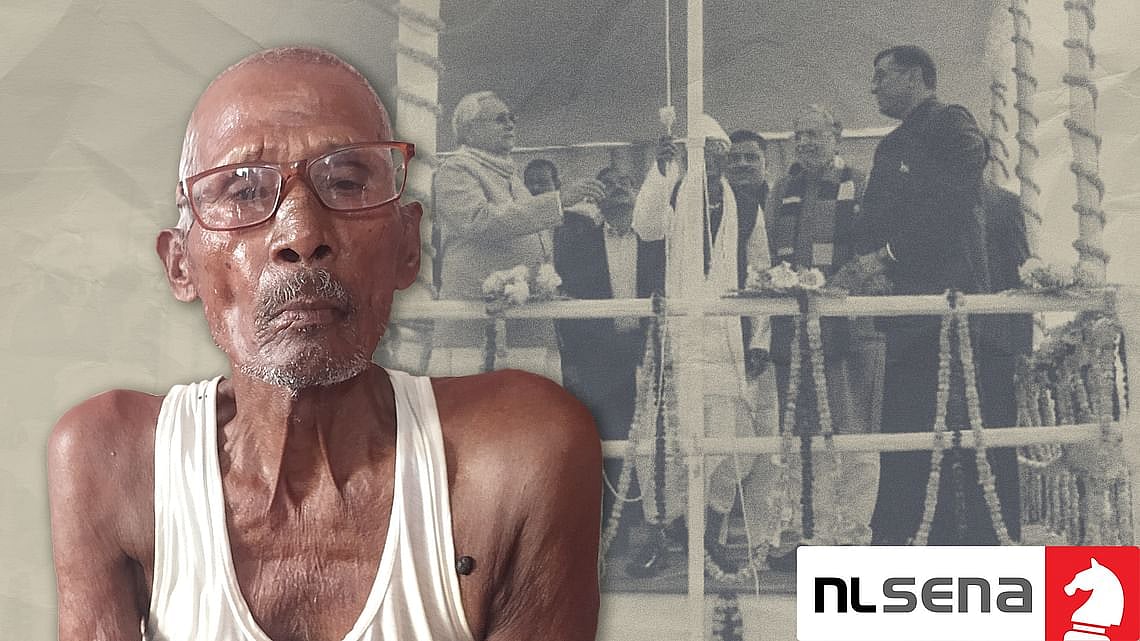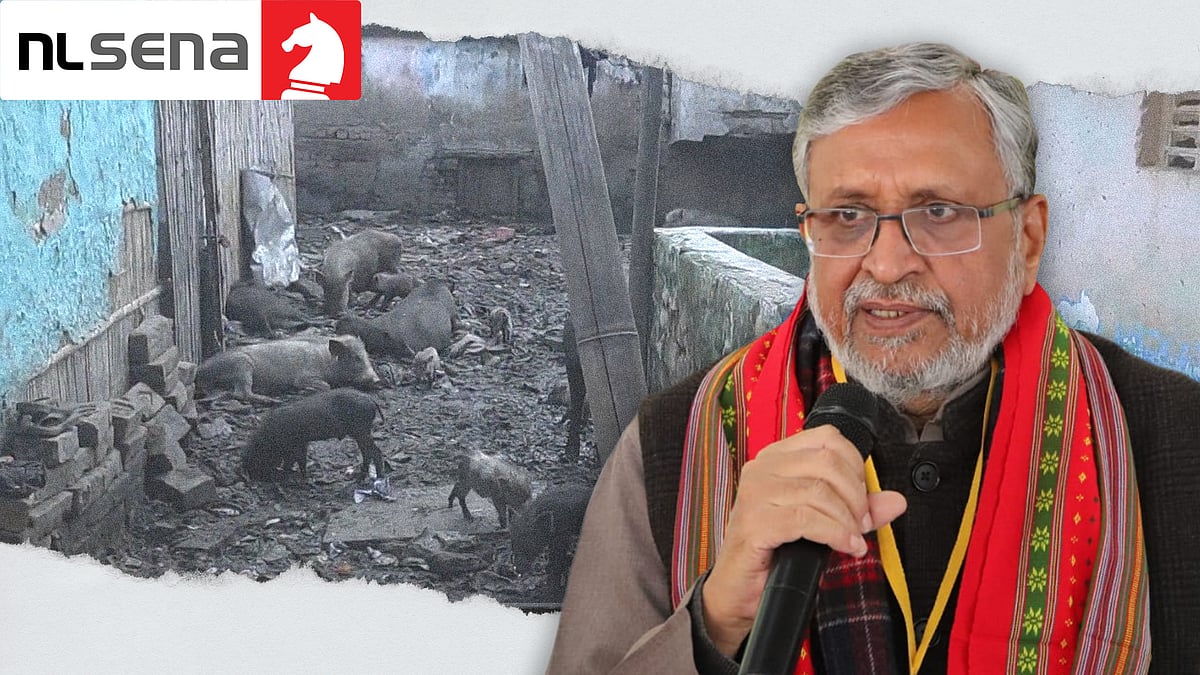All’s well in Nitish Kumar’s village, except there are no jobs
Unemployment is a burning issue in this election and even the residents of the chief minister’s village, Kalyan Bigha, are frustrated.
It’s been 15 years of Nitish Kumar’s chief ministership in Bihar, and the popular belief is that any new government scheme in the state is first brought to his home district of Nalanda.
But unemployment is still rampant in Bihar, and it’s no different in Nalanda. This problem hasn’t even been solved in Kalyan Bigha, Nitish Kumar’s village about 25 km from Nalanda. It’s often touted as a “modern village”, but the youth here struggle with unemployment.
With the Bihar Assembly election just round the corner, Newslaundry visited Kalyan Bigha to gauge the mood on the ground.
The road leading to the village was clean and in good condition. Most of the residents practise farming, and we passed a hospital and a school before coming across a group of young men fishing at a small pond.
When we brought up the election, one of the men said, “This time, Nitish would be gone.” He refused to repeat it on camera, but it was echoed by many of the villagers who spoke to this correspondent. There’s a tendency to refrain from speaking against Nitish, but the unhappiness is apparent.
Kanhaiya Kumar, 32, a resident of Kalyan Bigha, told Newslaundry that there are no jobs here.
“Everything else is there — drinking water, electricity, etc — but no jobs,” he said. “The government must start new companies here so we can work. Many people of the village go out to earn but have returned after the lockdown. After the lockdown ended, my older brother went back to Delhi to look for work, but couldn’t find anything. He’s not the only one facing this; it’s happened to so many others too.”
Another youth, Vikram, said he used to live and work in Delhi’s Badarpur. He had been visiting Kalyan Bigha before the lockdown, and has been here ever since.
“Everything else is fine,” he said about the village, “except there is no work. We’ve been sitting on our hands since March. There’s no work available outside.”


Key election issue
The pandemic hasn’t put a stop to the usual bells and whistles of an election: campaigning and rallies are taking place in full swing. And unemployment is a hot-button issue.
Rashtriya Janata Dal leader Tejashwi Yadav, who is the Mahagathbandhan’s chief ministerial candidate, recently promised that if his alliance wins, they would announce 10 lakh government jobs in his very first Cabinet meeting. Employment also features prominently in the Mahagathbandhan’s manifesto, which was released in Patna last week.
On the other side, BJP leader and state deputy chief minister Sushil Kumar Modi recently faced censure for a tweet where he said his government would leave no stone unturned to eradicate unemployment. If that was the case, he was asked, what was Nitish’s government doing for the last 15 years? How long do they need?
Nitish himself has faced flak for his obfuscating comments on unemployment in Bihar. “Had big industrialists come and set up industry here, the people would have looked at them and praised the industrialisation,” he said at his first rally.”Had this been a coastal state, they would have come running...The states which have a coastline get more industries. We tried our best.”
Unsurprisingly, this did not go down well with the Opposition.
As the election draws closer, voter angst about unemployment has only grown stronger. And this sentiment runs high in Kalyan Bigha.
‘Their policy is for the public to die’
A big tree stood at the beginning of Kalyan Bigha with a circular platform around it. There was a temple nearby, in front of which was Nitish Kumar’s ancestral home. It was a simple building with a lock on the door and a large pond before it, and a memorial lay adjacent to it, built as a tribute to the chief minister’s parents and late wife.
Villagers clustered near the tree. Many were around the same age as the chief minister, in their 60s.
“Since the beginning, Nitish hasn’t looked back. He lived here sparingly but now, he rarely visits,” said one of the villagers on the condition of anonymity. “He is a good man and has done good work, but he couldn’t provide employment.”



The village has roads, electricity and water, the villager continued, but 70 percent of the village’s 200-odd Mushar families have to go to Punjab and Haryana to work in brick kilns. “What are they getting from these roads and electricity?”
Jayesh Kumar, who runs a common service centre in the village, said the employment situation is “really bad” in Kalyan Bigha.
“Until the education system is fixed, nothing can be done,” said Jayesh. “All the ministers blow their horns about bettering education in the state but all of it is on paper. Nothing much has changed on the ground. The school here was inaugurated by Nitish Kumar himself, but no studies began at the school; only exams were conducted. There’s not a single teacher for Class 12.”
As we spoke, a man arrived with a pushcart of gol gappas. His name was Dharmendra Kumar and he used to work in Delhi but returned to the village after the lockdown. He now sells gol gappas to make a living.
“I stayed in Delhi for three months after the lockdown but work did not begin,” he said. “I couldn’t pay rent to the landlord so he forced us to leave. Somehow, we came back home by truck. The truck driver took Rs 3,000 to bring us here. The fact that Nitish couldn’t generate jobs in the state was why we left in the first place. He gave us all the facilities but no employment.”
Umesh Shah, a resident of Kalyan Bigha, chipped in: “We educated our children through loans and alms but they are not getting any jobs. Narendra Modi is privatising everything. Someone who got Rs 50,000 for a job would be replaced by five people who would earn Rs 10,000 each. This is their policy: for the public to die.”
Umesh is a childhood acquaintance of the chief minister. Has he ever brought up these issues with Nitish?
“Where would he have a chance to talk to us?” Umesh said. “He arrives, garlands what he must, and leaves. He is a big politician so he is short on time too.”
‘No money to put into our bank account’
At a recent election rally, Nitish claimed his government has given government jobs to over six lakh people in the last 15 years, and processes are “ongoing” for the recruitment of around 70,000 more people. Yet, lakhs of students graduate in Bihar every year and almost every government department has unfilled vacancies.
“There were more government jobs under Lalu’s administration than in Nitish’s,” said Pappu Thakur, a resident of Kalyan Bigha. “Who did these people employ? When he [Nitish] was the railways minister, even then he couldn’t employ anyone. Even the educated men in our village just wander from here to there. They took people’s land to construct the school, college and hospital, but still, no one got any work.”
Kanchan Devi’s house stands opposite the memorial to Nitish’s family in Kalyan Bigha. Her husband Suvinder Singh had his leg amputated some time ago, so Kanchan is the family’s sole breadwinner, working as a cleaner in the government hospital. She earns Rs 2,500 per month.
“We have everything except money. I receive only Rs 75 a day to get by. How is it possible?” Kanchan said. “If the amount increases, then we might not face such hardships every day.”
Weeping, she pointed towards her husband. “Look at his legs. Till Nitish babu’s mother was alive, she came to the village and we used to cook food for her. But today, we are destitute. He [Nitish] comes here three times annually on the death anniversaries of his mother, father and wife. I met him and told him about our problem. I went twice to his people’s court too, but to no avail. You tell me, how can a household run on Rs 2,500?”
Meena Devi, who runs a small samosa stall in front of Kanchan’s house, told Newslaundry that she earns around Rs 100 per day.

“If some industry comes here, then both men and women could work,” she said. “I make these samosas the whole day just to earn barely Rs 100. Should I feed my children from this Rs 100 or deposit it in the bank? The bank has a branch here but we don’t have money to deposit in it.”
Neelam Kumari, who makes samosas with Meena, said: “They only think about the big people. Who cares about us, the poor? The police have come many times to remove this shop. They claim it’s on government land and that we must remove ourselves from here. You tell us, where would we go? How would we live when we have no land of our own?”
But support for Nitish continues
Despite this litany of woes, many villagers had the same response when asked who they would support in the election.
“How can we abandon Nitish Kumar and support anyone else?” was the constant refrain.
“We have a bank, an industrial training institute, a senior secondary school in our village — all because of him,” said Rajiv Singh, a resident of Kalyan Bigha. “The unavailability of employment is a reality. We hoped he would fix this problem. Generating employment is a difficult task but whatever happens, we will not abandon him.”
Another villager, who was herding buffaloes on the edge of the village, said: “No matter who wins, we would vote for Nitish babu. Do you see this road? It wasn’t like that earlier.”
This story was translated from Hindi by Shardool Katyayan.
***
This story is part of the NL Sena project which 78 of our readers contributed to. Contribute to this project, Bihar Election 2020, and help to keep news free and independent.
 Nitish Kumar had Jhapsi Mochi hoist the flag on Republic Day. What did it get the elderly man?
Nitish Kumar had Jhapsi Mochi hoist the flag on Republic Day. What did it get the elderly man?
 Sushil Modi says Bihar is open defecation free. If only he looked outside his door
Sushil Modi says Bihar is open defecation free. If only he looked outside his door